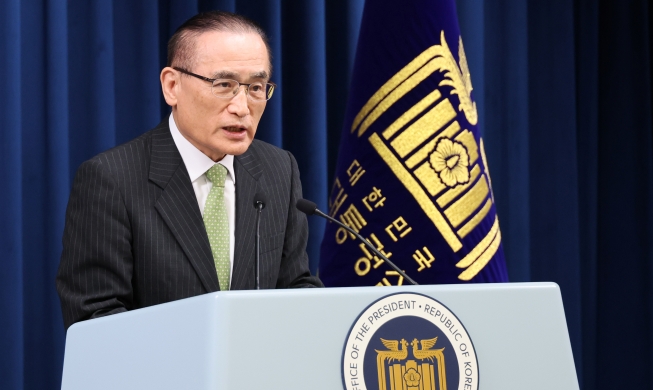Earlier this year in January, however, the KBS Symphony Orchestra performed "Rising Dragons" for the first time, a symphonic poem that's part of the "Songs of the Dragons Flying to Heaven" series.
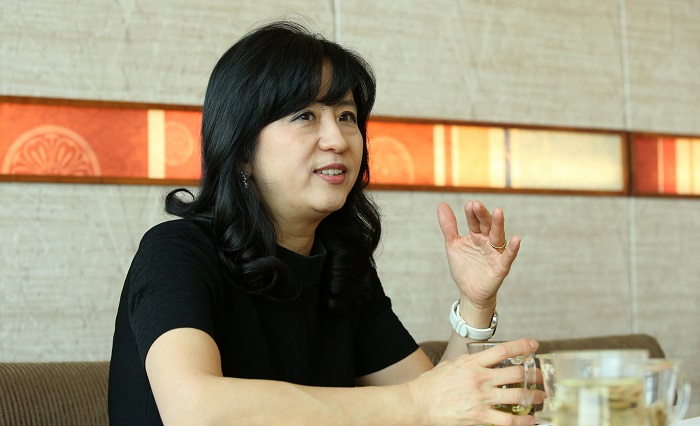
Composer Lim June-hee is often recognized for her skills at creating Korean style classical music, songs which are well-received on the global stage.
"Song of the Dragons Flying to Heaven" is a famous lyrical poem that admired the foundation of the Joseon Dynasty in 1392. The song was composed by Lim June-hee, composer and professor of Korean traditional music composition at the Korea National University of Arts. Lim's world of art is varied and wide. She has written many songs: "Soul Mate," an opera that tells a love story, "Uboosasisa," a traditional gugak cantata, "Hangang River," another cantata based on a symphonic poem, the "Hanbul" series of songs, a gugak concerto based on the novel "Song of a Woman's Soul," "Dancing Arirang," a piece of orchestral music, "Bari," a piece of theater music, "Dancing Sanjo," a piece of chamber music, "Yearning for You" and "Rainbow," both poetic songs, and "Duduri," a piece of electric music that combines modern music with traditional samulnori percussion. The list goes on.
It has often been said that she is capable of creating Korean music that can also be well-received on the global stage.
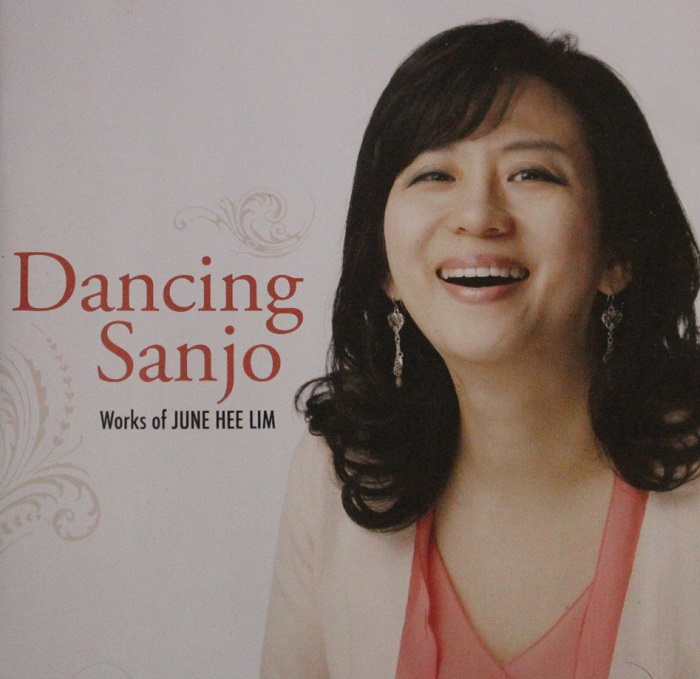
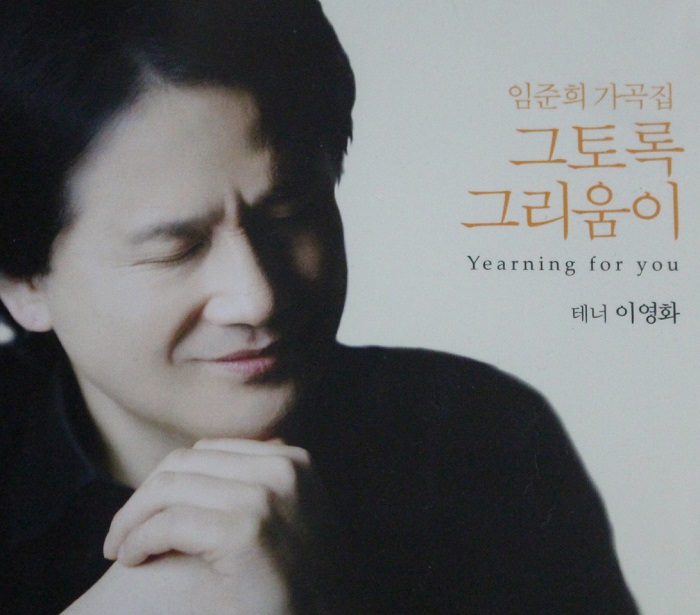
"Dancing Sanjo" (top) and "Yearning for You" (bottom) are the two of Lim's albums. "Dancing Sanjo," a collection of traditional songs, is for sale through Sony Music.
"Soul Mate" premiered in Frankfurt in 2006. It was praised as being an ideal combination of Korean and European elements. In 2007 the opera was performed and received rave reviews in Japan. It was also performed in Beijing in 2008, in celebration of the Olympics, and in Singapore in 2014. One of her outstanding works was the gugak cantata "Uboosasisa," which won the Korean Composition Award in 2011. It is regarded as having paved the way for traditional Korean music on the global music scene, giving birth to a new genre that combined Korean traditional music and Western music.
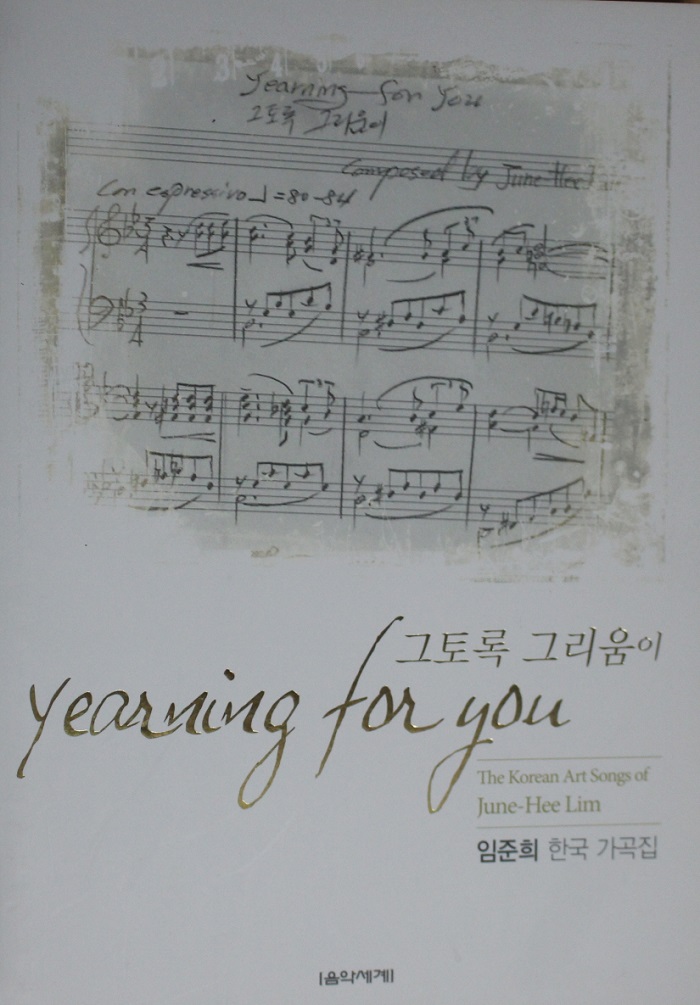
"Yearning for You" is a collection of Lim's poetic songs. It contains her 21 most-famous songs.
Even a few years ago when she was studying at Yonsei University for a bachelor's degree and then at Indiana University for a master's degree, she was pursuing Western, contemporary music. While in the U.S., She was shocked when her professors and colleagues asked her to play some traditional Korean music. She realized how little Korean people themselves were informed about their musical past. Since that point, she has started learning about Korean traditional music herself. She has sought to create her own style with the use of traditional methods, and immersed herself in communicating with the public through traditional songs that were re-translated and re-created with modern elements.
Korea.net sat down with Professor Lim to share the story about her songs and compositions.
The December 2, 1981, edition of the Kyunghyang newspaper reported that Lim June-hee, a 23-year-old student, won the gold medal in a university singing competition and received the grand prize: a piano. She donated the prize to the Ilsan Jangno Church in Gyeonggi-do (Gyeonggi Province). That was very generous of you. How could you give it up?
I attended such a competition for the first time that year. I won first place and the prize was a piano. I donated it to the church without hesitation. I heard that a lot of people at the church benefited from the instrument. Honestly, I think I am quite generous in most things. That is just who I am.
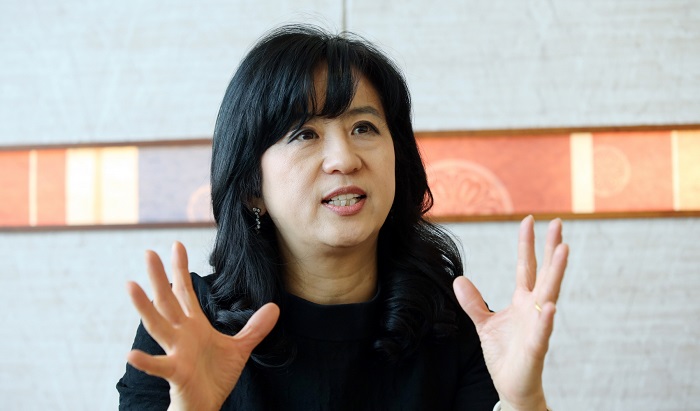
Professor Lim June-hee emphasizes that the merits of music and the arts is that they can give something to people.
You could have become a singer, as you enjoyed singing from an early age. Instead, you decided to compose. That decision seems like it was influenced by your mother.
Nobody in my family studied music. Instead, there are some who studied painting, drawing and other traditional arts. It's true that my mother influenced me a lot and helped me grow as a professional in this particular field. She was the first woman to graduate from the Korean Literature Department at Yonsei University. She always said that women, too, should have their own philosophy. She inspired me across a wide range of fields. Thanks to her, I pondered a lot over what I should do when I grow up.
My song "Land of Morning Calm" was used at the inauguration of President Kim Dae-jung in 1998. The song contains many meanings and messages. Through the song, I wanted to encourage people to overcome the financial crisis. I hoped that people with great abilities would join forces to brighten the world. The lyrics used in the song were written by my mother. She gave me a lot of other great poems and literary works that instilled patriotism in my heart. I liked the collection of poems by nun Lee Hae-in, and the works of authors Kang Eun-gyo, Choi young-mi, Ko Un and Ki Hyung-do.
You were a member of the Seoul City Boys & Girls Choir. You also carried out missionary work by singing. Did you compose, too, during your childhood?
When I was young, I was enormously active and curious. My friends and I enjoyed singing, playing guitar and dancing wherever we went, all in miniskirts. In my second year of high school, equivalent to North America's grade 11, I was selected as a missionary to travel around the U.S. Throughout that year, I was totally absorbed in exercising and left my studies behind.
I studied singing when I was in middle school, too, but that was only as a hobby. I didn't study composition until I entered my final year of high school. Professor Choi Hun-cha advised me to enter the composition department at Yonsei University. I think he had an insight into my abilities and talent.
The experiences and career you've built is the most important part of your talent. However, many people think that there is something native and inborn about your talents.
Most music majors have sensitive ears. It's the same for me. When I studied in the U.S., I heard a lot that I have a great ear. It's true that you can produce better sounds if you can listen to melodies. Great input brings great output.
To finish a composition, you should overcome the limits of time and endure physical labor. What has been the most difficult?
As a female composer, there are many difficulties. Most female composers will understand. Half of Korean female composers don't get married. Composition requires a lot of time, energy and effort. However, I was married. As I look back, I was able to concentrate on my music even more because I had a lack of time, compared to others. Also, that kind of thinking helped me spend my time in a smarter and wiser way. Moreover, the experience of raising kids and taking care of a mother-in-law were embedded in my songs. It was more likely to draw sympathy from listeners.
I believe that music and the arts are basically the study of humankind. I always ponder over what kind of music people require. The arts can never be separated from the daily lives of people. I want to share with others what I have. A number of artists are under stress and fear that the popularity they are currently enjoying might soon disappear. I always try to keep in mind that the arts are here to give, not to receive. That's why I am a bit more free from such stress and self-applied pressure.
In fact, my daily life is quite distant from the flamboyance shown on stage. I read, think and compose every day. It can be seen as boring, but I am happy when I am doing it.
Literature and music cannot be separated. Most of your works have a motif in Korean classical literature. What inspires you?
When I was in the U.S. studying contemporary music, I took an interest in the world of literature and religions, too. The biggest reason in doing so was that I wanted to help leave a trace in the world of people who lived in earlier generations, generations populated by my mother and father. I had a kind of responsibility that I should shed light on these cherished items from the past.
I had mixed feelings when I read "Honbul," an epic novel written by Choi Myung-hee. Choi dedicated 17 years to the creation of "Honbul" and passed away at the age of 40-something. I felt a necessity to highlight the spirit featured in the novel. As a female composer, I wanted to re-created it from my own perspective and thought that it would be good to perform it with traditional instruments. That's how I started to create my "Honbul" series, starting in 2003. As of today, I've written a total of five parts. All of them were produced in the form of a concerto, with different instruments used for each installment. The first part features a 12-stringed zither, a gayageum, and the last part a two-stringed fiddle, a haegeum. It was well received by non-Korean audiences, and began to draw attentions of Western composers. Currently, I am producing the sixth installment of the series, with a plan to feature a six-stringed zither, a geomungo.
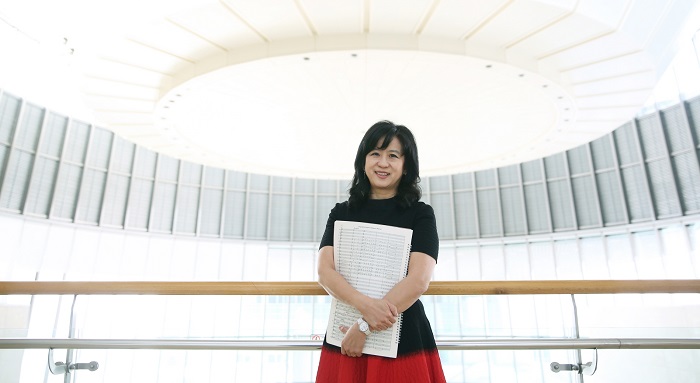
Composer Lim June-hee wants to expand the spectrum of artistic communication by featuring universal topics that can be enjoyed by all, regardless of nationality or ethnicity.
There are many works with a motif of ancient Joseon, including "Uboosasisa," "Songs of the Dragons Flying to Heaven" and "Soul Mate." What is the reason?
The poem "Uboosasisa," written by Yun Seon-do, is based on the story of a Joseon fisherman. It was recommended by Hwang Byung-ki, the then arts director of the National Gugak Orchestra. It was a great work and worth highlighting. I wrote it as a four-part series, one each about spring, summer, autumn and winter. It was two hours long. During the production, I learned and came to understand deeper every single meaning of the words. Once again, I thought that the Korean people should learn about their own music, instead of putting a continual spotlight on already famous global works, such as Shakespeare.
Where does your energy come from? It seems to never ware out.
To learn about new kinds of traditional music and to get first-hand experience of ancient sounds, I listen to and watch performances of ancient royal palace rituals that feature Jong-myo-je-rye-ak, Mun-myo-je-rye-ak, Su-je-cheon and Yeo-min-rak music, all specific types of classical Korean music. The more I study, the more I want to share with others. As I was preparing for such concerts, I learned that there are many amazing traditional musical instruments. There are the pyeongyeong, pyeongjong, eo, bu and bak drums, for example, and then there is the hun wind instrument. They all produce unique sounds that can never be heard anywhere else in the world.
Also, I believe we have a lot to share in terms of material. Starting earlier this year, I took part in a mentoring program at a music and orchestra academy. My role is to match librettists and composers, and to support their networks. Here, too, I prefer to select traditional material. There are two works being prepared. First is "Red Portrait" which shows the process of Yun Du-seo, a Confucian scholar, drawing a self portrait. Then there is "Aria of Heaven" which highlights the life of composer Yun Isang. It will be performed at a workshop scheduled for March. After about a year of training, I might bring it officially to the stage. A number of orchestra members and composers are waiting for their mentorship partners. I hope I can help with the matching.
There is harmony between the logic and emotion of your work. Many people are startled at your ability to compose whole series of songs. Also, you have a different style with similar instruments. Is there a strategy, or calculations, behind it?
The word "composition" itself contains the meaning of making something up of its constituent parts. It's true that I'm required to compose and to calculate when writing a song. Time management is also important.
It took about two years to complete "Song of the Dragons Flying to Heaven," performed at the New Year's concert by the KBS Symphony Orchestra. Though I still see a lot of the parts as being inadequate, it gave the audience a new experience of Korean traditional instruments. It was quite meaningful that the orchestra representing Korea played traditional court music, composed by a Korean composer, for the first time at a concert held on the first day of the new year. It should have been taken for granted. Why have we never thought about this before?
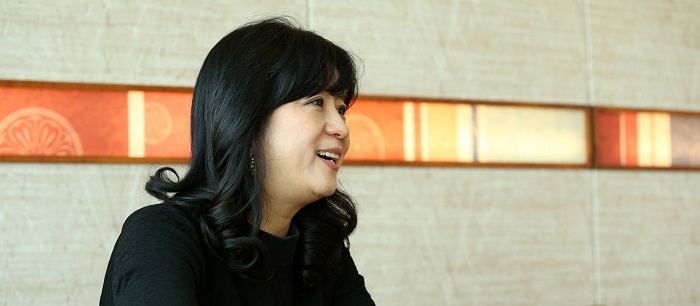
Composer Lim June-hee wishes to express the Korean people's 'jeong' in her work. Jeong, as she defines it, is the love people have for their community and the love people have for peace.
Your work "Hangang" is reminiscent of Smetana's "My Fatherland." Were you inspired by Korean history?
I modeled Smetana's work. I expressed my wish that all the people be united and be recognized globally. Also, I wanted to spread a message of peace and harmony.
I believe that these types of songs show the Korean people's love for humanity and the "emotional culture" of Korea. For example, through his music, Beethoven strived to give people enlightenment about love, peace and respect for humanity. I deeply sympathize with him. I want to spread a message of peace and love via my songs. The "Cantata" series and my "Song of Arirang" are an extension of this.
I believe that Korean music is the perfect tool to express jeong, a notable feature of the Korean people. I would like to define it as the love people have for one another and the love people have for peace. Ironically, however, Korea is currently separated into two. I want to forget about ideologies and meet a wider audience with musical ideas.
"Soul Mate," performed by the National Symphony Orchestra last year, was well-received. Some people criticized its simple plotline, however, where the characters were destined to find a partner from a similar social class and of a similar social status. Was there a reason not to give the story any change?
The original story has the male protagonist of noble birth meeting a female servant. For this production, however, we decided to go with a simpler storyline. Now it focuses on the meaning of people-to-people ties that are destined by Heaven.
Any work is heavily influenced by its time of production. Most works produced during that period of time were dark and sad. Our team decided to come up with a story with a happy ending. Instead, we took care of the characters to add to the fun. However, in my eyes, too, the story is quite plain. It needs some dramatic reversal.
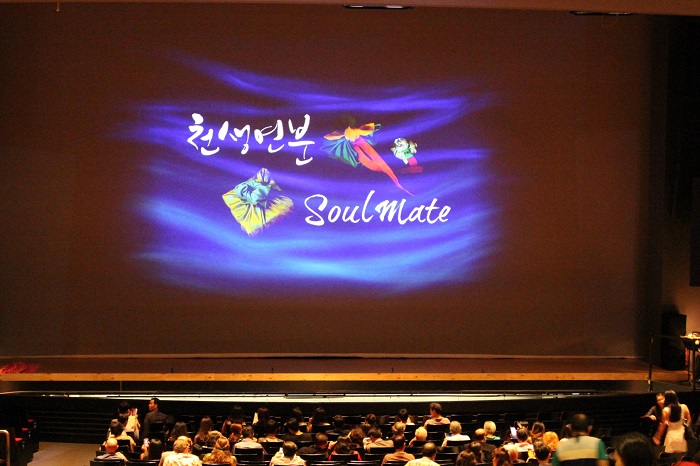
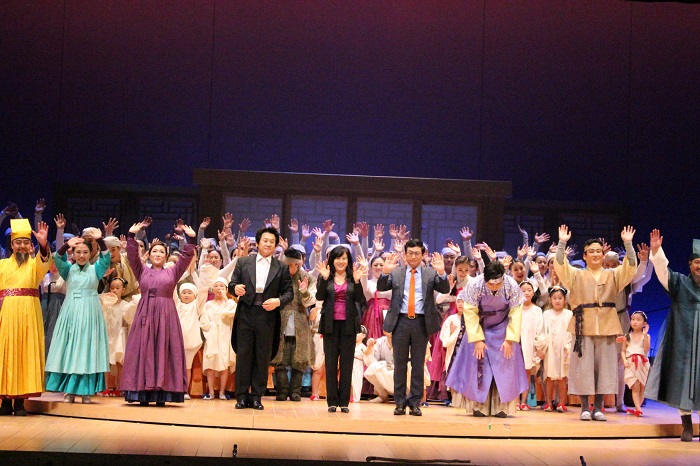
'Soul Mate' is a combination of Korean and European elements. Pictured is a performance of 'Soul Mate' in Singapore in October 2014.
There is no clear boundary between European classical music and traditional Korean gugak. As you combine them together, what have you created?
Composition is creation. Basically, it is the process of melting all of your experiences and creating a new thing. I can decide whether to use traditional materials or contemporary materials. For me, I want to use something that can show off my own style. I always look to discover traditional elements and translate them into a contemporary style.
Traditional instruments such as the two-stringed fiddle, the haegeum, and the 12-stringed zither, the gayageum, can sound contemporary depending on how it's translated. I would like to produce natural and refreshing sounds to tear down the boundaries of genres.
I am currently working on "Pantheon" with author Go Jae-gwi. It's set to hit the stage in April. It's a bit early to explain the work. It's a story set in a frozen land with no space and no time. It's about one's self-identity, existence and questions like, "Who am I?" and, "Why was I born?" I would like to show my color and style in this work. I would like to deal with these types of universal topics that can be enjoyed by everyone, regardless of their nationality or ethnicity.
What is music to you?
It's the love for my fellow human, expressed through music.
The beauty of music can be enjoyed only if you have love for your fellow human. Without it, music is just meaningless.
By Wi Tack-whan, Lee Seung-ah
Photos: Jeon Han, Wi Tack-whan
Korea.net Staff Writers
whan23@korea.kr
